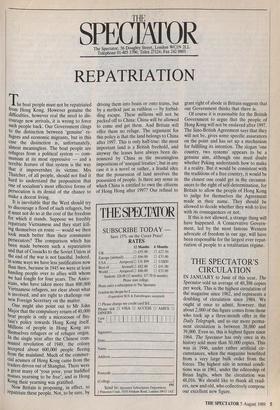SPECTAT T OR
The Spectator, 56 Doughty Street, London WC1N 2LL Telephone 01-405 1706; Telex 27124; Fax 242 0603
REPATRIATION
It is inevitable that the West should try to discourage a flood of such refugees, but it must not do so at the cost of the freedom for which it stands. Suppose we forcibly repatriate Vietnamese and they start kill- ing themselves en route — would we then look much better than their communist Persecutors? The comparison which has been made between such a repatriation and that of Cossacks to the Soviet Union at the end of the war is not fanciful. Indeed, in some ways we have less justification now than then, because in 1945 we were at least handing people over to allies with whom we had fought for four years. The Mier- jeans, who have taken more than 800,000 Vietnamese refugees, 'are clear about what is involved, and are right to challenge our new Foreign Secretary on the matter.
One might also point out to Mr John Major that the compulsory return of 40,000 boat people is only a microcosm of Pri- taM's policy towards Hong. Kong itself. Millions of people in Hong Kong are themselves refugees or of refugee origin. In the single year after the Chinese com- munist revolution of 1949, the colony accepted about 600,000 people fleeing from the mainland. Much of the commer- cial acumen of Hong Kong came from the traders driven out of Shanghai. There were a great many of 'your poor, your huddled masses yearning to be free', and in Hong Kong their yearning was gratified.
Now Britain is proposing, in effect, to repatriate these people. Not, to be sure, by
driving them into boats or onto trains, but by a method just as ruthless — by forbid- ding escape. These millions will not be packed off to China: China will be allowed to come and get them. And Britain will offer them no refuge. The argument for this policy is that the land belongs to China after 1997. This is only half-true: the most important land is a British freehold, and anyway the leases have always been de- nounced by China as the meaningless impositions of 'unequal treaties'; but in any case it is a novel or rather, a feudal idea that the possession of land involves the possession of people. Is there any sense in which China is entitled to own the citizens of Hong Hong after 1997? Our refusal to
grant right of abode in Britain suggests that our Government thinks that there is.
Of course it is reasonable for the British Government to argue that the people of Hong Kong will not be enslaved after 1997. The Sino-British Agreement says that they will not be, gives some specific assurances on the point and has set up a mechanism for fulfilling its intention. The slogan 'one country, two systems' appears to be a genuine aim, although one must doubt whether Peking understands how to make it a reality. But it would be consistent with the traditions of a free country, it would be the closest one could get in the circumst- ances to the right of self-determination, for Britain to allow the people of Hong Kong to judge for themselves the Agreement made in their name. They should be allowed to decide whether they wish to live with its consequences or not.
If this is not allowed, a strange thing will have happened. A Conservative Govern- ment, led by the most famous Western advocate of freedom in our age, will have been responsible for the largest ever repat- riation of people to a totalitarian regime.


















































 Previous page
Previous page